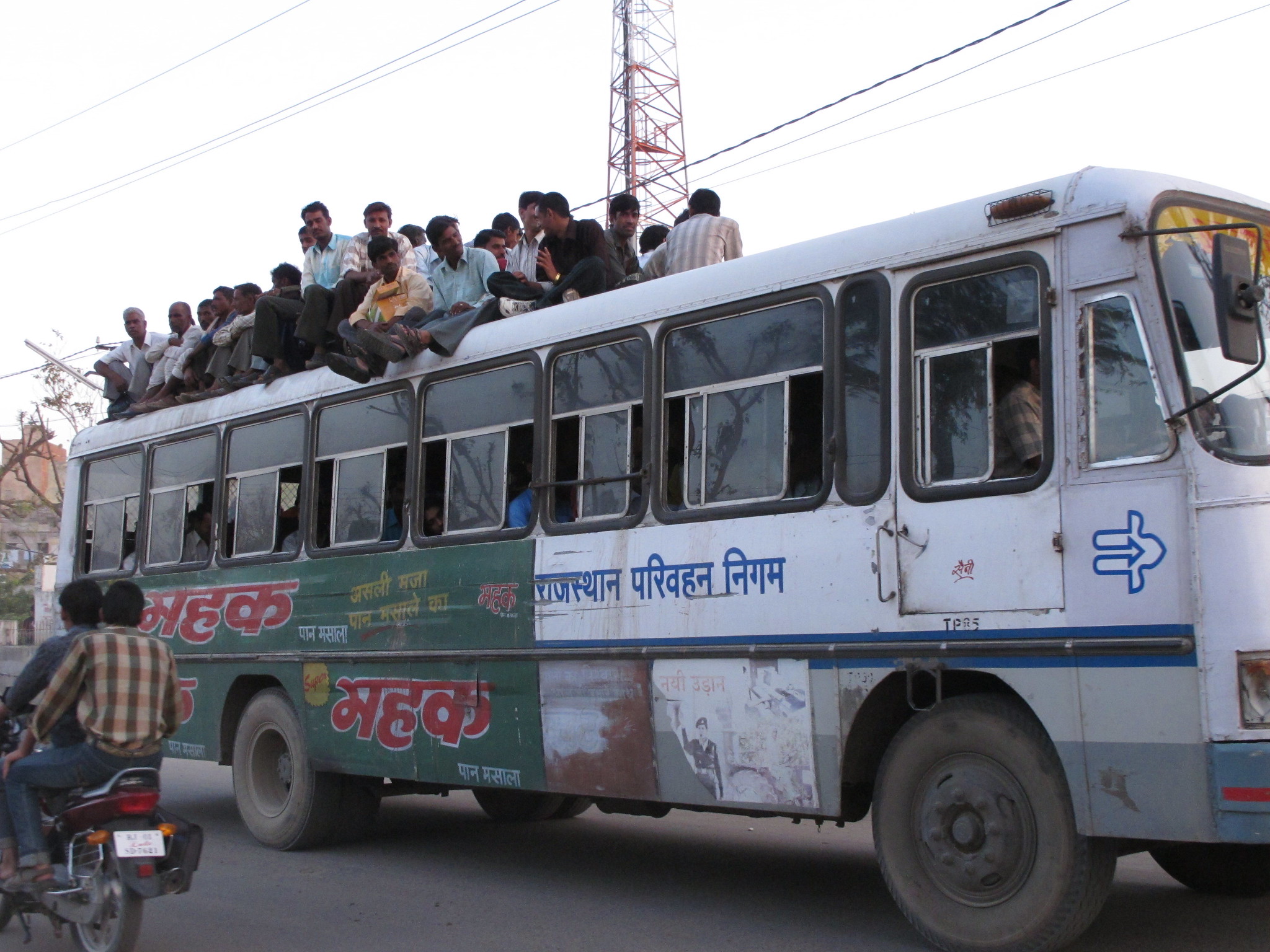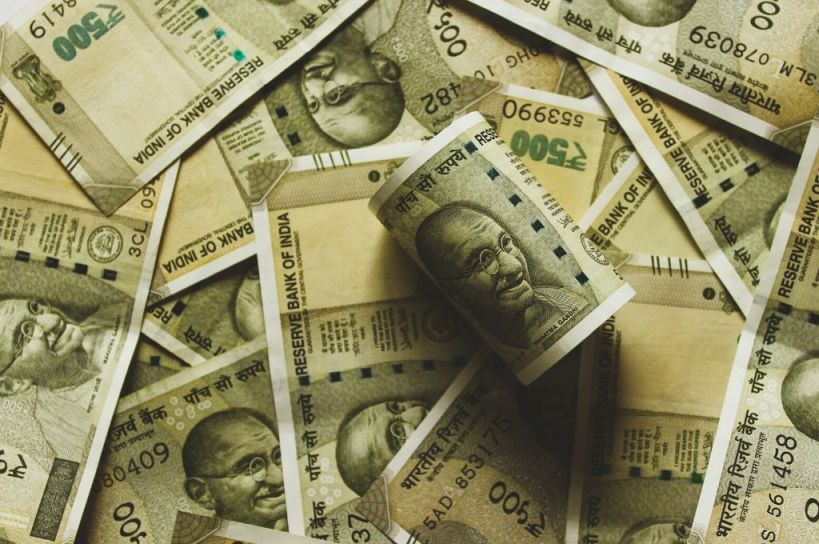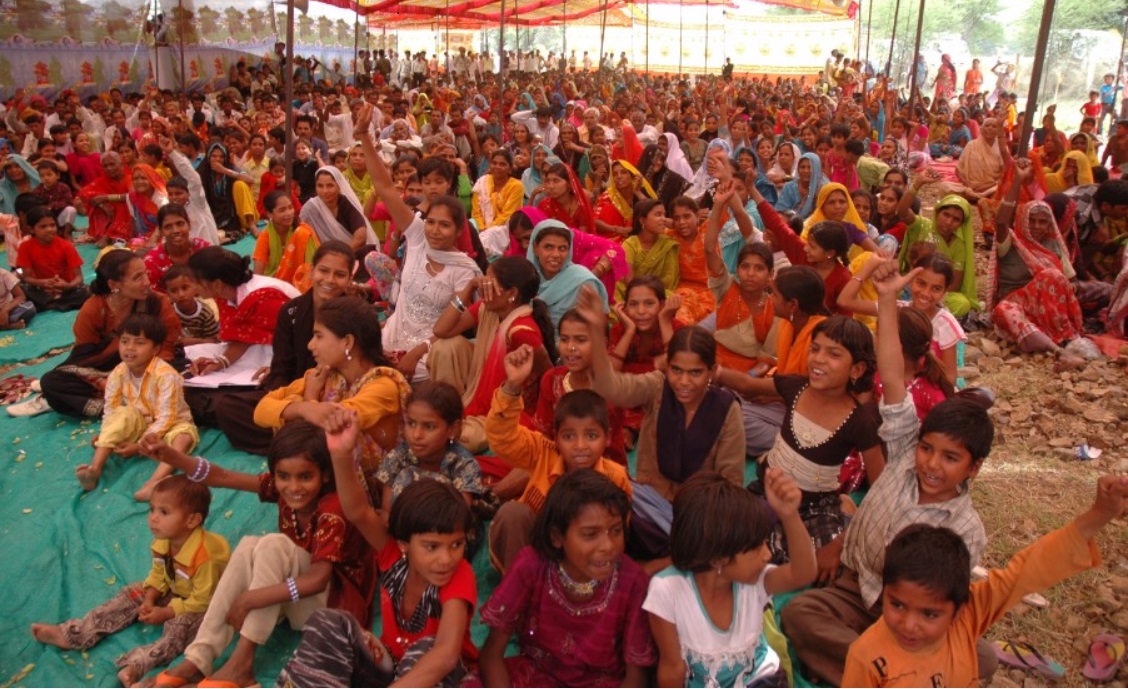When I last spoke to forty-eight-year-old Gyandin it had already been over two days since he—along with nine co-workers—began walking from Haryana back to his village in Palera Block in Tikamgarh, Madhya Pradesh.
I had called him as part of an outreach survey being conducted by Jan Sahas—the organisation I work at—to assess the needs and shortages of migrant workers stuck in transit.1 Gyandin is one of the 51 million workers working in the construction industry which has ground to a halt after the lockdown was announced by the Government of India on 24th March. His contractor did not give him any money for the days he had worked in March and his phone is switched off. “In the last two days different sets of policemen have beaten me and my co-workers more than four times. One constable made me crawl on the road because I was violating the lockdown. In many villages that we have passed through, people have thrown stones at us, saying that we are carrying the virus. We don’t have any money left with us and we haven’t eaten anything for the last one day, but we are going to continue walking, because we just want to reach home.”
One constable made me crawl on the road because I was violating the lockdown.
I haven’t been able to reach him for the last couple of hours; I’m hoping it’s only because his mobile phone is out of charge, or because he is in the the dense forests that you need to walk through to reach Tikamgarh; that is, if has been able to fight hunger and thirst, and survive.

The construction and agricultural sectors contribute eight percent and 16 percent to India’s GDP.2 The construction sector alone employs 51 million workers directly; these are the men and women who have built our roads, flyovers, factories, and plush buildings enabling our lives to function and the economy to grow. About 90 percent of these workers work on temporary contracts. Many of them also alternate as daily wage workers on farms when construction work is unavailable.
Related article: Supporting informal workers during the COVID-19 crisis
Relief measures but no clear orders from the government
Economic depravity in India is often related to social inequality, with many of these workers belonging to Schedule Castes, Schedule Tribes, and other backward communities. When the announcement of the lockdown was made, no references were made to the millions of migrant workers who were living away from their homes, in tin huts in invisible labour colonies, and surviving on daily wages.
The Finance Minister announced relief measures on 25th March, but since then no orders have been released in a systematic or uniform manner to inform the state and district machinery about how this relief should reach the poor living in rural and urban India.
Many of the orders that have been issued do not have any implementing or monitoring grounds. For example, the order to employers to continue paying both permanent and temporary workers cannot be monitored for adherence because of the lack of data at the government level.

The government response cannot begin and end with the lockdown
The COVID-19 epidemic is one of the largest shocks to the Indian economy, the impact of which we are just about starting to experience. However, the response to fight the spread of the virus cannot begin and end with the lockdown.
It is the responsibility of the state to ensure that while fighting the virus, we are not killing our own citizens.
It is the responsibility of the state to bring public, private, and civil society actors together to capitalise on their strengths and ensure that we do not kill our own citizens while fighting the virus.
The past week has exposed the brutal class bias that exists not only in the way that policies are made and implemented, but also in the way that upper- and middle-class India is choosing to look away from what could turn into a hunger epidemic.

When the announcement of the lockdown was made, no references were made to the millions of migrant workers who were living away from their homes, in tin huts in invisible labour colonies, and surviving on daily wages. | Picture courtesy: Flickr
The response is miniscule compared to the magnitude of the need
We are connected to 1,12,000 migrant workers through our work. Based on this we estimate that more than two lakh migrant workers are stuck in transit between Delhi, Noida, Haryana, and other places, heading towards Uttar Pradesh and Madhya Pradesh.
We have been contacted by bus operators who are willing to provide buses and fuel at no cost, to pick and drop these labourers from where they can be found, to their respective districts. However, passes that allow the buses to ply, need to be sought with the local authorities on a case-by-case basis; this is impacting the pace at which these buses can go on the roads.
A few nonprofits, including us, have begun emergency relief operations: picking up migrant workers who we are able to trace, bringing them to district testing centres, and then sending them back home with relief material to last for at least a couple of weeks.
Many of our efforts are being delayed by the lack of clarity or response from the state.
Even while we are engaged in these efforts, we are able to see that our response is miniscule compared to the magnitude of the need. Many of our efforts are being delayed by the lack of clarity or response from the state. For example, issuing passes for people and vehicles to travel, facilitating the provisioning of relief material for migrant workers who are not carrying their ID and documents, and so on.
Related article: The implications of COVID-19 for rural India
Based on our practical experience we plead for the following:
- Public appeals to be made by political, religious, and social sector leaders to be supportive of migrant workers who are trying to get to their homes safe and sound.
- Ensure the wide availability of safety gear (soaps, sanitisers, masks) to relief workers, government employees, and workers in transit.
- Arrange transport in collaboration with state- and privately-owned bus operators to transport migrant workers in a safe and secure manner to testing centres.
- Provide passes on an urgent basis to civil society organisations who want to provide relief.
- Provide food, water, and shelter in a dignified manner while migrant workers are in transit, and/or being tested, and treated.
- Provide access to relief material that migrant workers can carry back to their homes.
- Provide access to cash payments for at least 3-6 months to ensure sustenance and prevent migrants workers from falling into a debt trap.
Our fight to stop the spread of the virus cannot be at the cost of the lives of the very people who build our urban infrastructure and sow the food we eat. The words of Tulsidar, a migrant labourer from Lalitpur in Uttar Pradesh who is now stuck in Dehradun echoes in my ears, “For the last two days I have been feeding both my children only water since I cannot get out of the tin sheet house I live in because of the police. This way hunger will kill me before Corona does”.
Let’s make sure that his worst fear doesn’t come true.
- As part of the work we do, Jan Sahas is connected with more than 1,12,000 migrant families at destination in all the districts of Delhi-NCR and some locations of Mumbai, as well as at the source in 15 districts of Bundelkhand and Malwa-Neemad region of Madhya Pradesh and Uttar Pradesh through a Longitudinal Migration Tracking (LMT) system.
- Page 18 of the Economic Survey 2018-19.
—
Know more:
- Read first-hand accounts from daily-wage earners and migrant workers who are leaving Delhi.
- Go through this photo-essay, which documents migrant workers trying to board buses at the Delhi-Uttar Pradesh border.
- Learn how the state can manage the movement of people, food, money, and schemes to prevent distress.
Do more:
- Contribute to organisations working to support communities who are facing the brunt of the pandemic.




